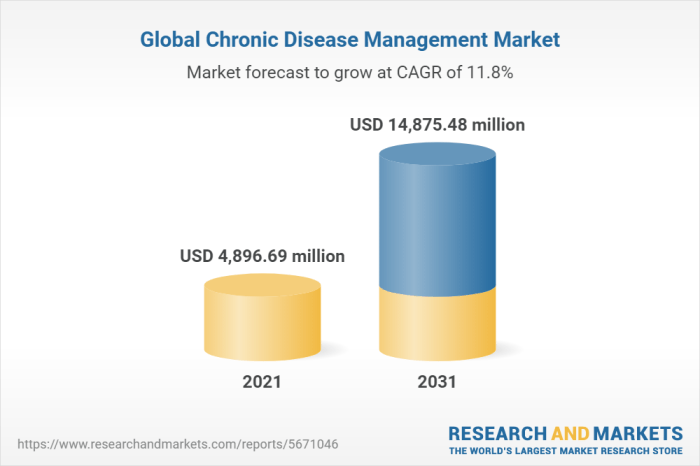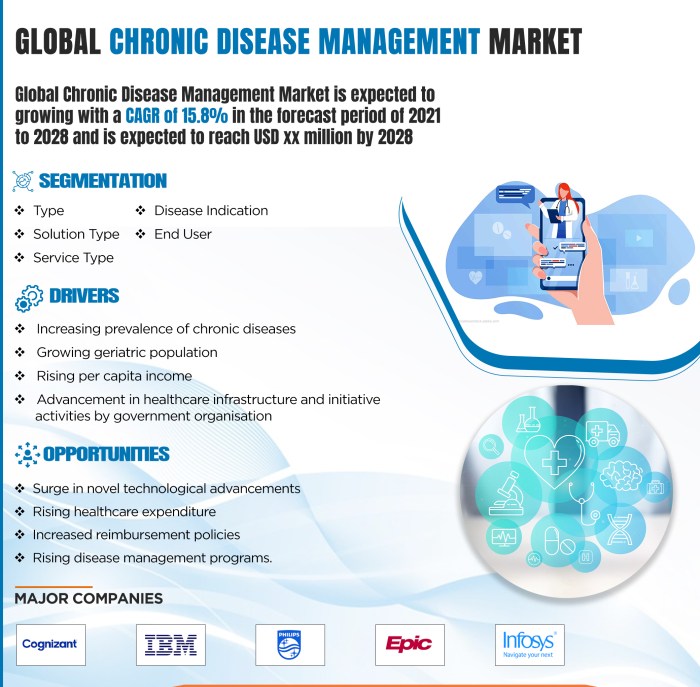Global Trends in Chronic Disease Management sets the stage for this enthralling narrative, offering readers a glimpse into a story that is rich in detail and brimming with originality from the outset. As we delve into the intricacies of managing chronic diseases on a global scale, a world of innovative strategies and impactful initiatives unfolds before us.
Overview of Chronic Disease Management
Chronic diseases are long-term conditions that require ongoing management and care. Addressing chronic diseases on a global scale is crucial due to their significant impact on individuals, healthcare systems, and economies worldwide.
Importance of Addressing Chronic Diseases Globally
Chronic diseases like heart disease, diabetes, cancer, and respiratory conditions are leading causes of death and disability globally. By addressing these diseases effectively, we can improve the quality of life for millions of individuals and reduce the burden on healthcare systems.
Impact of Chronic Diseases on Healthcare Systems
Chronic diseases place a heavy burden on healthcare systems due to the long-term care and treatment required. They often result in increased healthcare costs, hospitalizations, and the need for specialized care services. By effectively managing chronic diseases, healthcare systems can allocate resources more efficiently and improve overall patient outcomes.
Common Chronic Diseases Requiring Management
- Heart disease: A leading cause of death worldwide, including conditions like coronary artery disease and heart failure.
- Diabetes: A chronic condition affecting blood sugar levels, requiring careful monitoring and management.
- Cancer: A group of diseases characterized by the uncontrolled growth of abnormal cells, with various treatment options available.
- Respiratory conditions: Chronic diseases like asthma and chronic obstructive pulmonary disease (COPD) impacting breathing and lung function.
Current Global Trends in Chronic Disease Management

Chronic disease management has seen significant advancements in recent years, with emerging technologies playing a crucial role in improving patient outcomes and quality of care. Telemedicine has also revolutionized the way chronic diseases are managed, providing remote access to healthcare services and monitoring.
Personalized medicine has become increasingly important in tailoring treatment plans to individual patients, taking into account their genetic makeup, lifestyle, and preferences.
Emerging Technologies in Chronic Disease Management
In the realm of chronic disease management, emerging technologies such as wearable devices, mobile health apps, and artificial intelligence are being used to track patient data in real-time, allowing healthcare providers to monitor and intervene proactively. These technologies enable remote patient monitoring, medication adherence tracking, and personalized health coaching, ultimately leading to better disease management and improved patient outcomes.
Role of Telemedicine in Managing Chronic Diseases
Telemedicine has transformed the way chronic diseases are managed by providing convenient access to healthcare services without the need for in-person visits. Patients can now consult with healthcare providers virtually, receive remote monitoring of vital signs, and access educational resources from the comfort of their homes.
Telemedicine has bridged the gap in healthcare accessibility, especially for patients in remote areas or those with mobility limitations, enhancing the overall management of chronic conditions.
Importance of Personalized Medicine in Chronic Disease Management
Personalized medicine focuses on tailoring medical treatment to individual characteristics of each patient, including their genetic makeup, lifestyle, and environmental factors. By analyzing these factors, healthcare providers can create customized treatment plans that are more effective and targeted to the specific needs of each patient.
Personalized medicine in chronic disease management has the potential to optimize treatment outcomes, minimize adverse effects, and improve patient satisfaction and adherence to therapy.
Strategies for Improving Chronic Disease Management
When it comes to managing chronic diseases, implementing effective strategies is crucial in improving patient outcomes and reducing the burden on healthcare systems. By focusing on preventive measures, patient education, and collaborative approaches, healthcare professionals can make significant strides in managing chronic conditions.
Preventive Measures for Reducing the Burden of Chronic Diseases
- Encouraging healthy lifestyle choices such as regular exercise and balanced diet
- Screening and early detection programs for high-risk individuals
- Implementing vaccination programs to prevent infectious diseases that can lead to chronic conditions
- Addressing social determinants of health to reduce disparities in chronic disease prevalence
Significance of Patient Education in Managing Chronic Conditions
- Empowering patients to take an active role in managing their health
- Improving medication adherence through education on the importance of treatment compliance
- Enhancing self-management skills to monitor symptoms and seek timely medical help
- Providing resources and support for lifestyle modifications and behavior change
Collaborative Approaches Involving Healthcare Professionals
- Establishing multidisciplinary care teams to provide comprehensive and coordinated care
- Utilizing telemedicine and digital health tools for remote monitoring and patient engagement
- Engaging primary care physicians, specialists, nurses, and other healthcare providers in care coordination
- Promoting shared decision-making between healthcare professionals and patients to tailor treatment plans
Global Initiatives and Policies in Chronic Disease Management

Chronic diseases pose a significant challenge globally, leading to increased morbidity and mortality rates. In response to this growing health crisis, various international initiatives and policies have been implemented to combat chronic diseases and improve management strategies.
International Efforts to Combat Chronic Diseases
- The World Health Organization (WHO) has launched the Global Action Plan for the Prevention and Control of Noncommunicable Diseases, setting targets for reducing the burden of chronic diseases worldwide.
- The United Nations Sustainable Development Goals include targets related to reducing premature mortality from non-communicable diseases through prevention and treatment measures.
- The Global Alliance for Chronic Diseases (GACD) brings together health research funding agencies to support collaborative research efforts aimed at addressing chronic diseases on a global scale.
Policies Supporting Better Management of Chronic Conditions
- Many countries have implemented policies to promote healthy lifestyles, such as tobacco control measures, sugar taxes, and restrictions on unhealthy food marketing to reduce the risk factors associated with chronic diseases.
- Integrated care models that focus on multidisciplinary approaches to chronic disease management have been implemented in various healthcare systems to improve patient outcomes and quality of life.
- Policies aimed at increasing access to essential medications and treatments for chronic conditions, particularly in low-income countries, are crucial for ensuring equitable healthcare for all individuals.
Successful Public Health Campaigns Targeting Chronic Diseases
- The "5-2-1-0" campaign, which promotes five servings of fruits and vegetables, two hours or less of screen time, one hour of physical activity, and zero sugary drinks per day, has been successful in raising awareness about healthy lifestyle choices.
- The "Stoptober" campaign in the UK encourages smokers to quit smoking for the month of October, leading to significant reductions in smoking rates and improvements in respiratory health.
- The "Hearts of Gold" campaign in Ghana focuses on raising awareness about cardiovascular diseases and promoting heart-healthy behaviors to reduce the burden of heart-related conditions in the population.
Ultimate Conclusion
In conclusion, Global Trends in Chronic Disease Management paints a vivid picture of the evolving landscape in healthcare, highlighting the pressing need for collaborative efforts and cutting-edge solutions to tackle chronic conditions worldwide. As we navigate through the complexities of disease management, one thing remains clear - the future holds endless possibilities for reshaping the way we approach and address chronic diseases.
FAQ Guide
What are some key challenges in global chronic disease management?
Key challenges include access to healthcare services, disparities in healthcare systems, and the rising costs associated with managing chronic conditions.
How can telemedicine revolutionize chronic disease management?
Telemedicine allows for remote monitoring, timely interventions, and improved access to healthcare for individuals with chronic diseases, enhancing overall management and care.
Why is personalized medicine important in the context of chronic disease management?
Personalized medicine tailors treatment plans to individual patients based on their genetic makeup, lifestyle factors, and specific health needs, optimizing the effectiveness of disease management.









